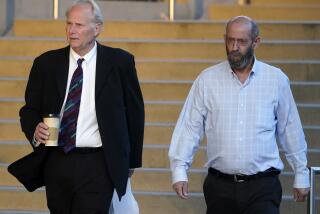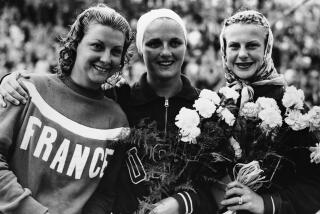Kimball Nears Freedom : Jurisprudence: The father of a youth who died in Olympic diver’s drunk-driving accident is outraged by shortened prison term.
- Share via
Robert Bedell has Nov. 24 marked on his calendar.
Bruce Kimball has it etched in his mind.
That is the date Kimball, a 1984 Olympic silver medalist in 10-meter platform diving, is expected to complete his sentence for an Aug. 1, 1988, drunk-driving accident in which his car slammed into a group of teen-agers, killing Bedell’s son, Robbie, and Kevin Gossic and injuring six others.
Kimball, 30, is living in Spectrum Dade Chase, a residential substance abuse treatment facility in the Miami area. During the day, he works, rebuilding structures in the wake of Hurricane Andrew. At night, he returns to the facility.
His father, Dick, a five-time U.S. Olympic diving coach, including during the 1992 Games, is enthusiastic about his son’s opportunity to work. He is convinced that it will prepare Bruce to return to society next November.
Bedell is outraged.
“I didn’t realize that he was out walking around,” Bedell said. “He’s working during the day, so do I. He goes home after work, so do I. I’m in prison as much as he is. I think he should be in prison the whole time, under maximum security the bulk of the time. And whatever alcohol programs he needs should have been administered there.”
Bedell and his wife, Theresa, have attended every parole board meeting involving Kimball, who was originally sentenced to 17 years in prison.
“He was sentenced for 17 years, based on the crime he committed,” Bedell said. “Just because the prisons are overcrowded, they’ve shaved off time and shaved off time, and moved up the release date and moved up the release date.
“I don’t think people in the general public really realize when they see someone sentenced for a certain time that they aren’t going to serve that time. It used to be one-third of the original sentence. For Bruce Kimball it’ll be about 25%, and he’s out (on work release) now.”
Kimball was imprisoned in late January of 1989. If he is released in November, as planned, he will have served 4 years 10 months, or 10 months less than the one-third generally considered to be the minimum.
For Kimball’s family, however, it has been a long, long time.
Dick, Bruce’s mother, Gail, and his brother and sister, Jim and Vicki, have taken turns each month, traveling to Florida from their home in Ann Arbor, Mich., to visit Bruce. All of them visited him last month to celebrate Christmas.
“We’ve tried to give him support,” Dick Kimball said. “We’re just glad this thing--him being in prison--is finally over. We’re just happy he’s made his way through there, and that he’ll have a chance to start a new life.”
The elder Kimball hopes that his son can maintain a low profile when he is released. “There was way too much publicity before,” he said. “He doesn’t want that to happen again. He doesn’t want to be hounded.”
The publicity was intensified by Kimball’s participation in the 1988 Olympic trials, only 17 days after the accident. It was a decision that angered many, who thought it was bad enough that Kimball drove at an estimated 75 m.p.h., that his blood-alcohol level was twice the legal limit and that he killed two teen-agers and injured six others, two seriously.
But for him to go on with his plans to make the Olympic team?
Public sentiment was clear: Kimball showed little remorse for his crime and lacked sensitivity for the family and friends of the victims.
“At the time I was mad that he was out (on bail) to even go,” Bedell said. “So the justice system failed.
“And I think U.S. Diving and the (U.S. Olympic Committee) were insensitive in allowing him to compete. Heck, they suspend amateur athletes and pro football players when they are on steroids and drugs. Here, he was not only on alcohol, he killed two people and they allowed him to compete.
“And he was insensitive to go on and compete as if nothing had happened. It was appalling.”
Kimball was supported by the close-knit U.S. diving community at the trials in Indianapolis, and until making a poor dive in the ninth of 10 rounds he was on his way to the Games in Seoul.
People wearing T-shirts that read, “Remember the Victims,” watched in silence. The rest of the crowd cheered his dives.
He finished fourth in an event in which two made the Olympic team.
Kimball was encouraged by diving people again last summer when Danny Compain won a national age-group championship in Austin, Tex. Compain was one of several divers Kimball coached last year.
Although Kimball was not in attendance because he cannot travel outside of Florida, word spread that he had trained Compain.
Kimball was allowed to coach only after parents of the Hurricane diving club were informed of his past.
“There wasn’t one person that had any reservations about Bruce working with their kids,” said Randy Ableman, Hurricane head coach and coach of the University of Miami diving team.
“I kept up with Bruce when he was in jail, and he went through a lot of changes. I told them about that.”
Ableman, who formerly competed against Kimball, said Kimball has matured and is more responsible.
“He takes full responsibility for what happened,” Ableman said. “He wants to go on with his life and make a positive impact on kids. I wish he was still coaching.”
Kimball had to leave his coaching post because the pool the diving team used was knocked out of commission by Hurricane Andrew.
Along with his carpentry jobs, Kimball mans the switchboard at the treatment center. Although he made a few comments by phone last week, he declined to discuss his situation in detail.
“The best thing for me right now is to do what I have to do and take care of my responsibilities around here,” he said.
As his release date nears, Kimball sees the light at the end of the tunnel.
The Bedells do not.
“When you lose one of your children, it’s something you can’t describe,” Bedell said. “No one can understand unless it happens to them.
“For my wife and I, it doesn’t go away. You get to a point of equilibrium. You focus on day-to-day things. But that is as good as it gets.
“We had aspirations for Robbie: to see him go to college and to get married. We think about Robbie every day. So it’s never over for us.”
More to Read
Go beyond the scoreboard
Get the latest on L.A.'s teams in the daily Sports Report newsletter.
You may occasionally receive promotional content from the Los Angeles Times.






